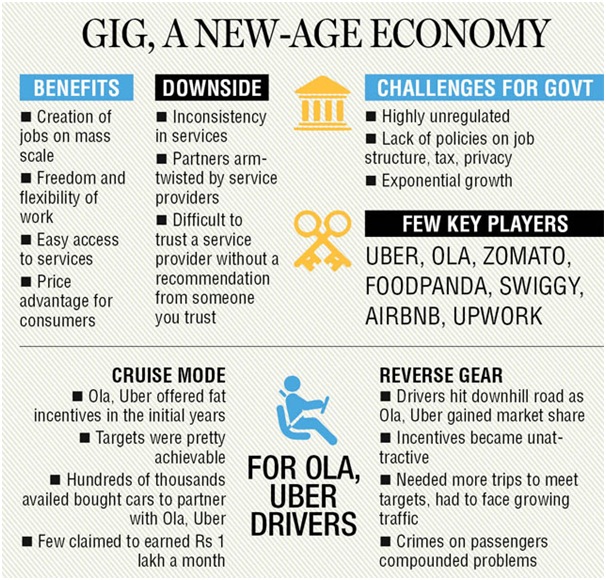

Context
The COVID-19 pandemic pushed a lot of people out of work. CMIE data showed that a whopping 113.6 million people lost their jobs between March and April 2020 in India.
Background
Status of Gig Economy-
- The ‘gig’ economy has grown significantly globally, in the past decade with the advent of technology platforms like Ola, Swiggy, Urban Company among others.
- As per estimates, India is likely to have 350 million gig jobs by 2025.
Analysis
What is gig economy?
- As per the World Economic Forum (WEF), gig economy is defined by its focus on workforce participation and income generation via “gigs”, single projects or tasks for which a worker is hired.
- Gig economy includes all platforms that hire independent workers across sectors like e-commerce, technology, food & beverages, home services among others.
- As per an ASSOCHAM report, there are 15 million freelance or gig workers across India.

Key drivers of Gig economy in India-
- Emergence of Startup Culture
- Rise in freelancing platforms
- Impact of Covid-19 and subsequent job losses.
- Government support to gig economy by steps like ‘Code on Social Security.’
Why gig economy is important for India?
- For workers-
- Enjoy flexible hours
- Choice of work
- Ability to enhance income by doing multiple gigs.
- For companies-
- Avoiding cost of social security and fixed remuneration
- Save overhead costs on office space and equipment
- Give them greater recruitment flexibility.
- Provide more options to recruit gig talent given the opportunities it affords in the current market scenario.
- For economy-
- As per a BCG report, the gig economy has the potential to serve up to 90 million jobs, add up to 1.25% to India’s GDP.
- Enable India to harness demographic dividend, which is estimated to be around 65%, and average age of India is 28 years.
Gig economy and female empowerment-
- Flexi jobs make it easy for females to handle dual responsibility of home and work.
- May lead to increase in female LFPR (Labour force participation rate)
- According to a study — ‘The Impact of COVID-19 and Industry 4.0 on Future of Work for Women’, undertaken jointly by the UNDP and FICCI, gig economy have the potential to absorb more women and increase their participation in the workforce with some amount of reskilling.
- Issues-
- Limited social benefits and less bargaining power
- Reflection of traditional barriers in gig economy as well such as occupational segregation and gender pay gaps.
Challenges faced by gig economy-
- Pockets of protest by workers of cab and delivery services from time to time.
- Low payment and more working hours (often more than 8 hours, and all days of the week).
- Poor working conditions
- Ambiguity regarding Employee- Employer relationship-
- Ambiguity around the rights of workers and the responsibilities of platforms that allows businesses to treat their gig workers.
- Lack of social security as gig workers are considered different from others.
Steps by government-
- Code on Social Security 2020 which states that the central government will
- Register gig workers
- Set up a‘Social security fund’ for them.
- According to the Labor ministry, over a dozen companies and aggregators such as Swiggy, Amazon and others, have committed INR 500 Cr to the proposed social security fund for gig workers in India
- Budget 2021-22 focus on gig workforce
- It proposed gig workers would now be covered by the Employees State Insurance Corporation (ESIC).
- Women will be allowed to work in all categories and also in night-shifts with adequate protection.
- It proposes to launch a portal that would collect relevant information on gig economy workers, including those working in building and construction, among others.
- This portal would help formulate relevant policies for health, housing, skill, insurance, credit and food schemes for the gig sector.
Way forward
- Need for formalisation-
- According to the Economic Survey 2020-21, pandemic and the wider adoption of e-commerce and online retail, spurred the growth of the gig sector considerably.
- It will lead to greater recognition of gig workers, their rights and their contribution.
- Enable easy hiring by employers.
- Talent upgradation-
- Easy and flexi options for reskilling, and upgradation by recognition of online courses.
- Easy availability of loan facilities to them to become entrepreneurs, thus promoting Start Ups in India.
- Learning from global best practices-
- International agencies like European trade union are proposing granting employee status to platform workers, thus guaranteeing minimum wage and welfare benefits.


